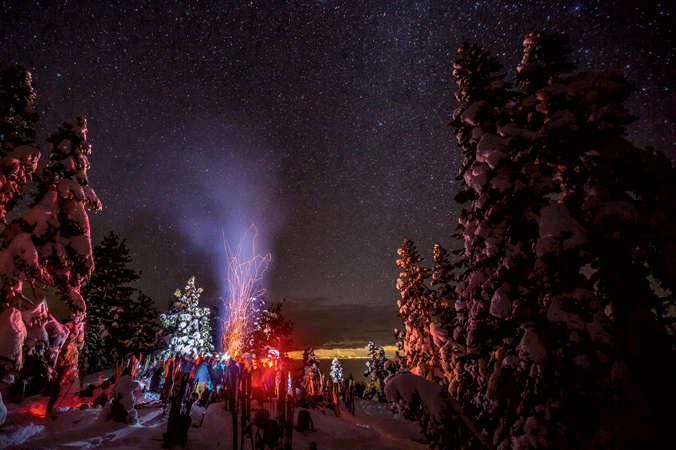
Nachtspektakel—a short skin to a three-course meal—closes out Alpenglow’s 2017 Mountain Festival. [Photo] Scott Rokis
After five years, a February storm was helping to bring California’s drought, the worst in 1,000 years, to a soft, white halt. In fact, it was halting everything. Alpenglow Sports, the Tahoe City-based backcountry and mountain-running shop, was hosting its fourth-annual Mountain Festival, offering a smattering of events like guided tours, avalanche courses and the Winter Wildlands Alliance film festival. The only problem: three feet of fresh had skyrocketed avalanche conditions and shut down the festival’s first scheduled tours.
So on Monday, day three of the nine-day event, I found myself inside Alpenglow’s North Lake Boulevard shop as part of the scheduled Beacon Search—a free workshop, like 99 percent of the festival’s events—held in a field out back and led by the shop’s beacon specialist, Jason Layh, 42.
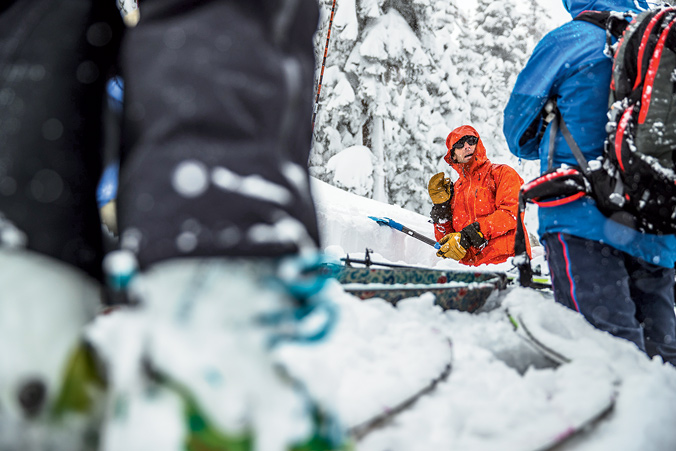
Sierra Avalanche Center forecaster Brandon Schwartz gets pitted. [Photo] Scott Rokis
“Does everyone have a beacon?” Layh calmly asked the group in his lilting Australian accent. A few in the crowd of nine shook their heads no, and Layh handed out extras from the table in front of him. “OK, can everyone turn their beacon on?” he continued, helping those unsure of which switch, exactly, to flip.
Luckily, this was the place to be confused. In many ways, that gets at the reason for this festival and why similar ones are popping up across the U.S.
Soon after acquiring Alpenglow in 2011 from Donald Fyfe, who founded the store in 1979, owner Brendan Madigan, 39, worked to consolidate the shop’s already existing events into a weekend endeavor. He dreamed of creating a resource for Tahoe’s growing backcountry needs, providing safety education, general off-piste know-how and a sense of community.
So after a summer Mountain Festival in 2013, which included yoga classes and trail races, Madigan and Alpenglow buyer and manager Jeff Dostie decided to expand their offerings into the winter. And they already had a perfect jumping-off point—since 2011, the duo had been holding community avalanche seminars in the shop that regularly drew more than 100 people.
“It dawned on me that there was a huge demand and craving for the sport we all love,” Madigan says. “We thought, why don’t we try to put on a festival weekend. Jeff and I would ski together every morning before work on the West Shore—and that’s where some of the most fun and successful ideas for a new chapter at Alpenglow emerged.”
By 2015, more than 2,000 people attended what had swelled to a nine-day gathering. And despite high avalanche conditions above, at and below tree line for the majority of the 2017 event, the festival drew 2,500 skiers and riders, mostly beginners and intermediates, from both the Tahoe region and San Francisco’s Bay Area, a population of seven million just three hours away.
“In the ski industry, we’re really good at depicting extreme athletes and rowdy lines, but the reality is, the majority of backcountry skiers are just normal skiers,” Madigan says. “We felt like there was a void in offerings for people to get into the sport. I think there’s a high barrier to entry—it’s expensive, and you have to have a formal education base. So we thought, why not cater this event to beginners and intermediates to allow them to experience the sport that we all love in a safe, welcoming and not-intimidating environment?”
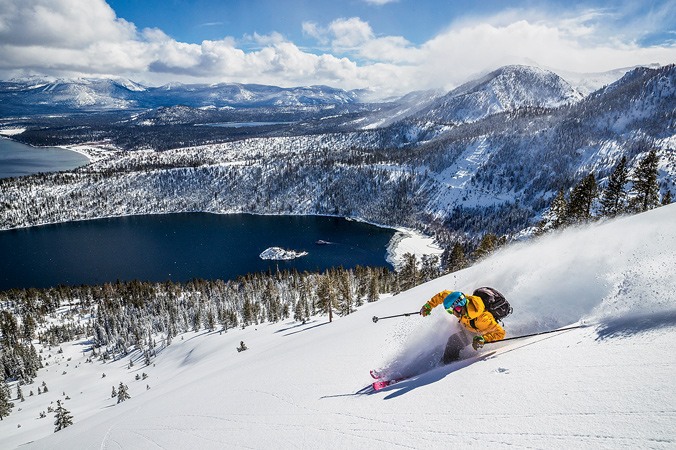
Alpenglow guide Nick Bliss teaches Slash Turn 101. [Photo] Scott Rokis
Addressing the boom through such festivals is a phenomenon popping up throughout the U.S. In March 2018, New Hampshire-based Synnott Mountain Guides and gear shop Ragged Mountain Equipment will partner with The North Face to host their second-annual Mt. Washington Backcountry Ski Festival. Guide Mark Synnott says he started the festival to fill a social void.
“I thought for a few years, this is an idea that’s overripe—someone’s gonna do it,” he says. “But no one did, so I did.” And even despite record-setting cold during last year’s inaugural festival, there were no cancellations, something Synnott attributes to the cohesiveness of the newly formed backcountry “tribe.”
“I’ve been backcountry skiing since the ’80s. The term ‘AT’ didn’t exist then—it was called randonnée,” Synnott says. “So this explosion is kind of a new thing. It’s forming within a generation. People want to share, get out there, hear stories and feel this sense of community.”
The rise in festivals, which cater their events to educating attendees on everything from avalanche safety to skintrack ethics, speaks to ever-growing numbers in the sport. According to SnowSports Industries America (SIA), there are approximately six million backcountry skiers and riders as of 2016, and as sales in resort-specific equipment have waned over the past decade, backcountry gear continues to fly off the shelves. That growth, combined with these festivals’ community-building atmosphere, help brick-and-mortar shops like Alpenglow not just stay afloat but thrive.
“I’ve been criticized sometimes that we’re only doing [the festival] to build goodwill in the age of Amazon and big box stores, and I’m OK with that criticism,” says Madigan, suggesting that some have implied he’s using the festival to get people into his store. “For me, it’s just our business model.”
To be able to safely and efficiently use that gear, including everything from AT setups to avalanche airbags, new users need some pointers, as well as a deeper understanding of the culture into which they’re embarking. Festivals offer that Intro 101 opportunity, while easing the obstacles that can accompany learning a new sport.
“I think the intimidation factor is incredibly realistic, because there’s so much knowledge and skill that go into being able to be adept at backcountry,” says Don Triplat, executive director of the Sierra Avalanche Center, which partners with Alpenglow’s Mountain Festival each year. “What people might not realize is there’s backcountry skills, skiing skills, first-aid skills, avalanche-avoidance skills and avalanche-rescue skills. So there’s a huge package of information and skills that go into being a competent backcountry traveler.”
Triplat suggests that, in addition to the skill set that festivals can provide, they also offer a chance for those venturing off-piste to gain ski partners and a greater sense of community and camaraderie. “One of the most important pieces of the puzzle,” he says, “is giving people a format and an opportunity to meet each other and get acquainted with the avalanche center.”
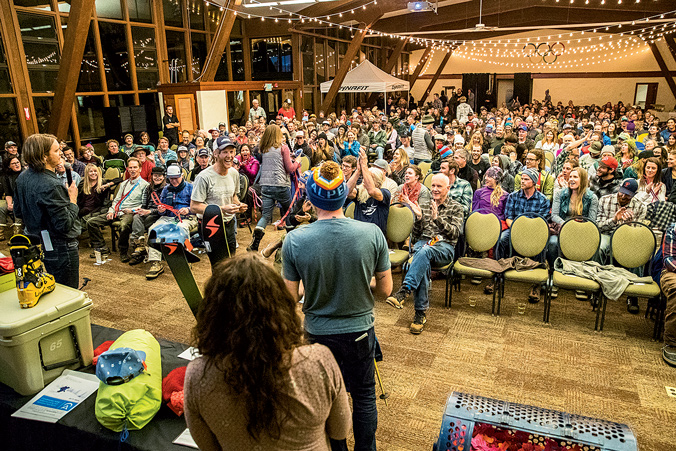
A Festivus for the Rest of Us at the Winter Wildlands Alliance film festival. [Photo] Scott Rokis
Those puzzle pieces slowly slipped into place as we crept forward through the snow-covered field behind Alpenglow, searching for a beacon that Layh had buried earlier. After a few more searches, two attendees turned to each other, noticing their beacons differed from the other. “Can I try yours out?” asked one woman, who, I later learned, had recently quit a finance job in San Francisco and moved to the area.
She went on to tell me that she was searching for a few things—some basic backcountry skills, like how to use a beacon and click into a tech binding, and some friends to tour with. And, if she got really lucky, maybe a new job to support her latest hobby.
“OK, put your beacon into search mode,” Layh yelled again. Carefully, each attendee did so, some with the help of the person queued up beside them. Then they crept forward, into the blizzard and toward the rest of the week’s opportunities.
—
This story was first published in the 2017 Skills Guide. This year’s Alpenglow Mountain Festival takes place from February 17-25.


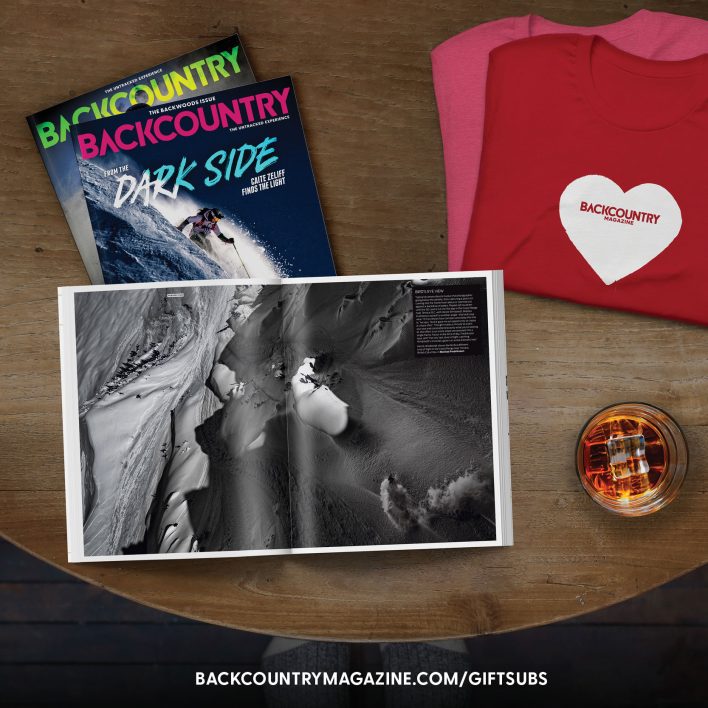




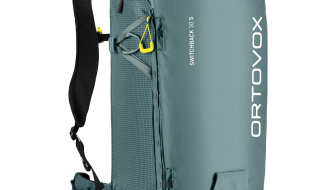
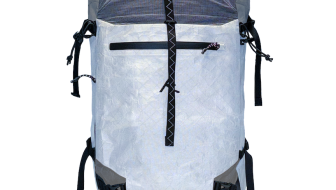

Related posts:
2019 Skills Guide: The Level Two Experience
The Snow Pro: Janelle Smiley talks the art of efficiency
The Skills Guide: Four Steps to Know Thy Self
The Skills Guide: Four steps for Blissful Ascents